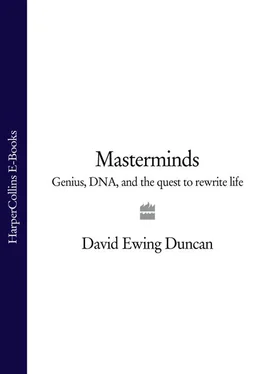Inside deCode, three towers containing labs, computers, and offices are connected by a glass-enclosed atrium four stories high, an airy and expansive space crisscrossed by open bridges between the towers. Hanging down from the ceiling, over the lunchroom, a gigantic model of a double helix turns slowly, picking up the dull, gray light from outside like an elongated disco ball. In one tower a supercomputer that can process a person’s entire genetic code in twenty minutes.
Stefansson’s office suite is across a bridge from the spinning DNA model. His large windows overlook the old Reykjavik airport, and the vast sweep of lava fields and mountains. He’s wearing his trademark tight black T-shirt and is preparing to drink two glasses of a Pepto-Bismol-colored drink he says is a protein supplement. I see Yeats’s Ghosts and the NASDAQ Rule Book , among other volumes, in his bookcase. He’s about to tell me the results of one of the tests run on my DNA.
KS:The DNA from you is, of course, a scary substance.
DD:I have friends who would agree.
KS:I’m sure. One of the things we did was that we looked at the genes that confirm a stroke. We have established that you have a series of genetic markers that give you something like a two to seven times greater risk for developing a stroke than if you don’t. You have this entire haplotype [inherited sequences of DNA that cause specific traits] so you probably have three times the risk. If this turns out to be the case in the American population, you are genetically predisposed to stroke.
DD:Oh, hmm. Stroke? But I’ve had no stroke in my family, other than my grandmother when she was eighty-three years old. Doesn’t my own family history weigh in here?
KS:The only thing you have done is to inherit a predisposition. What does that mean eventually? It means that if you stay in a certain environment, or if you are born in a certain environment, you will develop stroke.
DD:This is because most diseases are a combination of mutated genes and the environment—that is, the environment can trigger diseases, or not?
KS:Yes.
DD:But this isn’t good news for me. One day I’ll be watching a movie or walking down the street, and, suddenly, I’ll go limp with a stroke.
KS:Maybe, but here’s the beauty of the genetic profiling. It’s not going to lead to a genetic determinism like that. You are not going to develop stroke, all right? You now know that you have three times the possibility of the average individual to develop stroke. So you have a strong incentive to take measures to prevent stroke. One of them is to make sure that you don’t have high blood pressure; one of them is that you will not smoke. One of them is you will drink alcohol only moderately, because intake of large amounts of alcohol, binges, increases dramatically the probability that you will develop a stroke.
DD:But this genetic profile for stroke has not been tested for Americans. You’ve just tested Icelanders. Right?
KS:Before you can get too excited as an individual, you have to do a clinical trial in the population where you can use it, like in the American population. But this is a fairly interesting example of how genetic profiling is going to impact the delivery of health care.
DD:How common is this stroke gene for Icelanders?
KS:In Iceland, this is a haplotype that you find in about thirty percent of patients with stroke. You find it in about fifteen percent of controls [those without stroke]. And then you say, “Wow, fifteen percent of controls with no stroke.” But this is an inheritable predisposition. We know this from our genealogical data. Of these fifteen percent, a large percentage will eventually develop stroke. But most of these people carrying this haplotype will not develop stroke.
DD:Those odds still make me want to go and have a drink.
KS:You cannot drink anymore.
DD:Did you find out anything else about my DNA? Or do I want to know?
KS:We tested your ancestry to see if the population data from Iceland is relevant to you. You told us your ancestors came from Scotland. In the Icelandic Sagas, they said that Iceland was settled by Norwegian Vikings who stopped in the British Isles and picked up slaves and women, in Ireland and maybe Scotland. And we decided to test you by looking at your mitochondrial polymorphisms [mitochondrial DNA exists in each cell, separate from the double helix of human DNA; polymorphisms are DNA in an individual that are different from the norm]. Remember, mitochondria is passed from mother to offspring. Then we looked at your Y chromosome—these both are fairly good measures of paternal and maternal lineage. When we looked at this, it turns out that when we compare it to all of Europe, about seventy percent of Icelandic mitochondria are Celtic.
DD:The Celts being Irish and British, among others.
KS:Yeah, and about seventy percent of Icelandic Y chromosomes are Norwegian. So it looks like Iceland was settled by Norwegian boys who grabbed British girls. This is important when it comes to your mitochondrial DNA, because if we look at the mitochondrial sequence number one, that people look at mostly for ancestry, we find out that you have a haplotype that is characteristic for Europeans. However, when we look at region two, there is this very rare haplotype found only in Iceland and the north coast of the British Isles. We found this haplotype in you.
DD:Uh-oh, then this stroke gene is relevant to me.
[Stefansson calls someone on the phone.]
KS:[Into the phone] I’m out of coffee and I’m in a desperate need because I’m talking to a very boring fellow. [To me] My eighteen-year-old daughter would have said, “boring dude.”
That night, I meet Stefansson for drinks at an Italian restaurant that served, among the usual pasta and veal, horse meat, apparently an Icelandic specialty. After drinking enough red wine to give me a stroke for sure, we walk up the main drag of Reykjavik—there is only one, though the bars, clubs, and restaurants are as sophisticated as any in the world. Icelanders travel incessantly and take back music, art, dancing—and genetics—from elsewhere, integrating with their own sensibility.
In one bar heads turn when Stefansson walks in. He’s a rock star here, the second most famous Icelander after the pop singer Björk. He towers over most people and is known by everyone. I step over to the bar to order beers, and two Icelandic women say hello. One of them says she is in love with Stefansson, the other is annoyed with him, because, as many Icelanders did, she bought deCode stock and watched it tumble when biotech stocks took a nose dive in 2001–2003. Stefansson comes over and is sullen—he’s had a long day, but we drink until 3:00 A.M. As he says good night—and it’s still light out—Stefansson tells me that drinking tonight will kill me, that I’ll have a stroke for sure by morning. I walk home through the eerie lightness, with the streets slick with dampness in the air, and the distant volcanoes black and steaming. I wonder whether I should believe him and ponder the bioluminaries I am talking to about bioengineering humans, extending life, and regenerating hearts and brains, wondering, Can they be trusted?
Emerson wrote that every age has its geniuses, its masterminds who propel humanity in a new direction, for good or evil—though he also said you need circumstances to bring them out. I believe that the time is now. The circumstances are here. The masterminds are in place. The Prometheuses are bringing in the fire, the Florentines are carving Davids, Faustus is talking to the devil, and the Los Alamos boys are building the bomb.
Читать дальше












